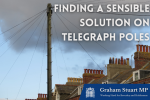Dear Julia,
Thank you for your time yesterday. We, and most importantly, our constituents, very much appreciate it.
We know that, after the meeting, previous meetings and numerous letters, you are fully aware of the situation.
Following yesterday’s meeting we wanted to write, with one voice, to make clear the unique problem in Hull and the East Riding.
The companies (KCOM, MS3, Grain and Connexin) have been unable to reach agreement on broadband infrastructure sharing for the good of residents. That is not acceptable to the residents of Hull and the East Riding.
For years we have received complaints from residents that there is no choice of broadband providers. While we welcome competition, the infrastructure should be delivered in a way that is sympathetic to the attractive communities we represent.
As Emma said, there is a race among the “alt-nets” to be the ‘second’ set of infrastructure. This will only continue while KCOM is dragging its feet in sharing its infrastructure. While we welcome your efforts so far, speed really is of the essence.
We ask you to put pressure on Ofcom to move forward its market review of Hull and the East Riding. As Dame Diana said, Ofcom seems to have no official problem with KCOM at this point. We need action on this now to force KCOM to open up its network.
While we understand that the Electronic Communications Code was written at a time when finding the way to have the nation connected to the internet was the priority, we now need to use the infrastructure we already have.
That means ending the permitted development of broadband poles where infrastructure already exists – be it poles or underground ducts.
The Government must act quickly to prevent our communities being covered in a spider’s web of broadband cables overhead while ducts which serve the same function are already under the streets.
You mentioned that you had not been made aware of safety concerns around the use of creosote in these poles. We have all received many complaints about this.
Graham wrote to Viscount Younger of Leckie, Parliamentary-Under-Secretary of State, regarding safety concerns raised with him about creosote on telegraph poles on 27 February and he replied last week. In his letter he said:
“The existing approval for creosote has an expiry date of 13 February 2025, and it is currently undergoing assessment for renewal of the approval. In addition, the 10 currently authorised creosote products are also subject to reassessment at the product authorisation renewal stage. Applications for renewal must be submitted to the HSE by 28 October 2024.
“Should the risks associated with either the active substance or biocidal products be considered unacceptable based on current evidence at the renewal stage, suitable regulatory action will be taken to mitigate or remove these risks.”
As there is such concern over the use of this product in highly residential areas, near schools and other highly populated areas, would it be prudent to reconsider this date and expedite the assessment to ensure that current evidence is considered as soon as is practicable?
We urge you to act quickly on this issue of great importance to our constituents so we can find a path to a resolution for the good of all residents in Hull and the East Riding.
Yours,
Rt. Hon. Graham Stuart MP
Rt. Hon. Dame Diana Johnson MP
Emma Hardy MP
This letter was sent to Julia Lopez, Minister for Digital Infrastructure, on 26th March 2024



